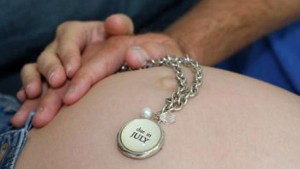 Sometimes research just proves what most people already know. For example, a recently published study shows women who give birth vaginally without epidural anesthesia and who are accompanied by a family member during birth are happier with the birthing experience than other women.
Sometimes research just proves what most people already know. For example, a recently published study shows women who give birth vaginally without epidural anesthesia and who are accompanied by a family member during birth are happier with the birthing experience than other women.
Also important in helping increase the mothers’ satisfactions are the attitudes of the healthcare personnel and starting early breastfeeding.
Mothers’ Satisfaction
Essentially, the results verified that early breastfeeding (meaning during the first 24 hours after birth) and a natural birth—without epidural anesthesia—have quite a positive effect on the mothers’ overall satisfaction with the experience.
The study also showed that women who were happy with the birth experience were more likely to be breast feeding at three months, versus mothers who were less satisfied with the delivery. Basically, mothers are more apt to breastfeed longer when they had a more satisfying birthing experience.
Additionally, women who breastfeed and had a satisfying birthing experience are less likely to suffer from postpartum depression.
Nobody looks forward to the pain and discomfort that accompanies childbirth. Thankfully, we are wired such that we tend to forget severe pain.
Pregnant women can choose to deliver their baby naturally—with all the pain it entails—or to have an epidural administered.
Epidural Anesthesia
An epidural relieves most of the pain, but not all of it, from the body below the waist. The medication can be increased or decreased based on a woman’s needs. Since very little medication reaches the baby, there aren’t usually any effects on the on the baby.
There can be, however, a few drawbacks to an epidural to the mother:
- A drop in blood pressure (which poses some risks to the baby)
- Difficulty urinating
- Itching
- Nausea
- Headaches
Epidurals are increasingly commonplace. According to the CDC, an epidural is used in approximately 66% of all births in the US.
Natural Birth
While natural childbirth is painful, women who give birth this way are more satisfied. There are relaxation and controlled breathing techniques that can help women who prefer not to use any medication during birth.
Whether or not you plan on an epidural, it is a good idea to ready yourself so that you have some strategies for coping with pain. If you have a pain plan, you will stay calm and be in better shape to deal with the pain when it arrives.
Here are some popular ways to handle pain during labor:
- hypnosis
- yoga
- meditation
- walking
- massage or counter pressure
- changing position
- taking a bath or shower
- listening to music (especially familiar songs)
- distracting yourself in some way:
- by counting
- performing an activity that keeps your mind otherwise occupied
- focus on something else
Know that your ability to endure the pain of childbirth has absolutely nothing to do with your “worth as a mother.” Preparing and educating yourself empowers you to choose what pain management works best for you.
All About Women is here to answer any questions you have about managing labor pains. Our devoted obstetricians and certified nurse-midwives know what an important time this is in your life, and we all feel honored to take part in it.


